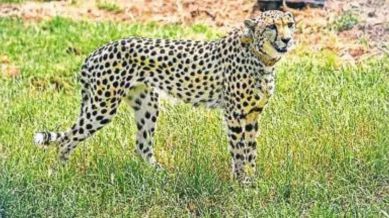Stay updated with the latest - Click here to follow us on Instagram
Project Cheetah audit flags concerns: ‘Unjustified’ expenses, Centre-state coordination
Kuno National Park officials say audit report not final, will respond to all questions raised

A report by the Accountant General of Madhya Pradesh has flagged concerns over the management of Project Cheetah at Kuno National Park (KNP), highlighting a “lack of coordination” between central and state government departments as well as issues regarding expenditure.
The concerns were raised in a sample audit of records – from August 2019 to November 2023 – that was made public Monday in response to an RTI query by wildlife activist Ajay Dubey.
monthly limit of free stories.
with an Express account.
Senior officials at KNP said the audit was ongoing and not final.
“These are not allegations, just questions that will be answered in the coming months. It is wrong to state that this is a final report. We will give all responses in the coming phases,” an official said.
KNP director Uttam Sharma declined to comment on the issue.
The audit flagged that there was no mention of cheetah reintroduction “in the work plan and management plan”, and that “there are no documents detailing where the cheetah reintroduction work began and how it started”.
The audit noted that Kuno was to be developed as an alternate habitat for Asiatic lions, as per the Supreme Court’s decision dated April 15, 2013, and the state government was “completely serious” about it.
“Thus, it was not clear whether the cheetah reintroduction would be conducted within Kuno National Park.
Consequently, no management plan specifically addressing cheetah reintroduction is available,” the report said.
The cheetah reintroduction is being conducted according to the Cheetah Action Plan 2021 prepared by the central government.
The audit report said: “It is evident from the statements of the Forest Division that there was a lack of coordination between the departments of the Government of India and the Government of Madhya Pradesh.”
“It is also clear that the ground staff and the Forest Division were not involved in the site selection or the cheetah reintroduction study. The matter has been brought to the attention of the government,” it said.
The report also flagged an “unjustified” expenditure of over Rs 90 lakh under labour expenses. It was mentioned in the work plan of the Kuno Wildlife Division that “employment and alternative sources of income for the local residents near forests should be provided”. The audit noted that “from September 2022 to June 2023, it was found that, in more than eight cases, brushwood removal and trench deepening work, amounting to INR 9,110,568, was carried out using JCB machines instead of labourers, contrary to the directions.”
The audit said the “practice of paying for manual labour while using machinery is irregular and resulted in a loss of employment for the local people and an increase in costs”.
The Forest Department said this was due to non-availability of labour and “payments were made based on manual labour rates”.
The audit further said there were irregularities in the construction of a 5.9-km wall. It said “67 fewer bags of cement were used than required, leading to a substandard construction”, and that there was an excess payment of Rs 4.14 lakh. It also said that royalty was not deducted for materials such as sand, gravel, stone, and boulders used in the construction, which indicated a loss of revenue.
The Forest Division said discrepancies in cement usage and payments were “due to technical reasons and corrective measures would be taken in future projects”.
According to the audit report, from the year 2021-22 to 2023-24 (up to January 2024), the expenditure on the Project Cheetah was Rs 44.14 crore, which “was not in accordance with the approved management plan”.
As per the approved management plan, Kuno Wildlife Sanctuary was identified as the second habitat of Asiatic lions (apart from Gir forest in Gujarat). However, as of November 2023, no efforts had been made to reintroduce Asiatic lions, the report said.
The report also highlighted the transfer of Divisional Forest Officer (DFO) Prakash Kumar not long after he received training from Namibia, saying that the “benefits of this training could not be utilised in the cheetah reintroduction, and the training proved ineffective”.